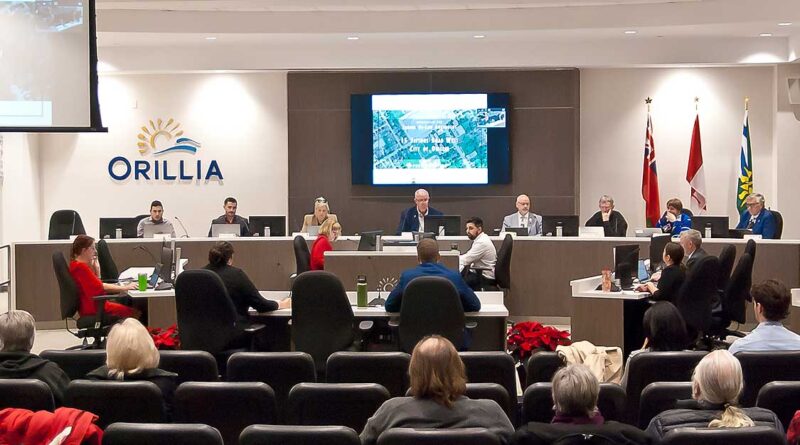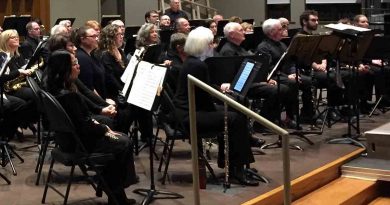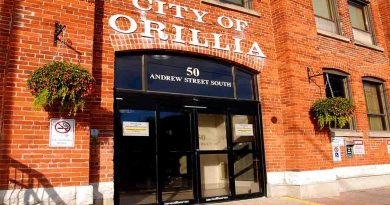Council Preview
By John Swartz
Orillia council has its last council meeting of the calendar year Monday December 9, following a meeting to ratify its decisions about the 2025 budget. See a separate analysis of the 2025 budget in a separate story later this week.
At the top, Allan Lafontatine and Brian Gibb of the Orillia District Chamber of Commerce will announce the winners of various trophies to participants of the Santa Claus Parade.
Next the public forum leads to a closed session which has seven items on that agenda.
First is a report regarding the replacement of the CAO. If you missed it, the current CAO, Gayle Jackson, is retiring at the end of the year. Another staff related matter, negotiations with the IBEW clerical and technical union will be discussed.
Three land matters are next, one is about buying some land, another to sell some land, and the last is information about property the City is interested in.
Two items are about board appointments. One is appoint members to the poverty reduction committee, the other to appoint someone to the Orillia Power Generation board.
Reports
Back in public, the item of most interest is about the province’s mental health and homelessness inaction. There are two reports, for and against, to endorse the province to use the Notwithstanding Clause in the Canadian Charter to do something.
Invoking the notwithstanding clause from a legislative perspective simply means enacting legislation in spite of provisions in the charter prohibiting an action contained in any legislation.
Councillors Janet-Lynne Durnford and Jay Fallis have a report saying the City should not join 15 other municipalities which want the province to disregard the charter and take some action.
What those municipalities want the province to do is instead of addressing the issues that cause people to become homeless, or are addicted to drugs, or have mental stability issues, they want the power to dismantle camps (which are frequently on public property – parks), and put people in jail who repeatedly violate trespass orders on those camps, and force people into facilities for mental health care.
In the report, the councillors state that 70 mayors and councillors elsewhere have opposed using the notwithstanding clause (some of those 70 are from the 15 municipalities who petitioned the province).
The report states using the clause violates section 2 of the charter (fundamental freedoms), section 15 (equality) and sections 7 to 14 (legal rights).
The councillors state the federal housing advocates report called on the government to address root causes, provide permanent housing, end dismantling of camps, and provide support to municipalities is the correct way to go.
The issue is government policy, federally, and provincially, has led to the homelessness crisis, left people with addictions and mental health issues (which are also contributors to homelessness) to their own devices, and criminalizing people with nowhere else to go, or turn, is not the answer.
The province takes the lion’s share of blame for the crisis by not funding healthcare and addictions treatment properly, and not (de-)regulating housing affordability standards. The feds on the other hand created the financial markets that treat housing as a commodity to trade rather than places to live.
In short, by using the notwithstanding clause in the manner desired penalizes people for living.
The inference in the tone of the report and accompanying documents is that if the province uses the notwithstanding clause, and it stands, it could then be used as precedent for other charter violating legislation to criminalizes other human behaviour or out-groups.
The report attaches a letter signed by 490 Ontario lawyers urging the premier not use the notwithstanding clause, and a letter from the Ontario Civil Liberties Association.
The bottom line argument to the report and supporting documents is, you cannot create the conditions that result in homelessness, abandon treatment for addictions and mental health, and then criminalize those affected.
Durnford and Fallis have several letters of support for their position. One from the Elizabeth Fry Society, one signed by more than two dozen local doctors , one from the Lakehead student union, and one on behalf of a coalition of food banks, legal clinics labour/disability/anti-poverty advocates.
Countering the argument is a report from councillor Whitney Smith. She wants the City to endorse the letter signed by the 15 other municipalities to use the notwithstanding clause.
Her argument is the motion she proposes, “does not criminalize homelessness but seeks to manage public safety.’
Yet, the letter from the 15 municipalities she wants the City to endorse states exactly the opposite, calling on criminalization of the homeless.
She is correct that these camps are costing municipalities a lot of money and there is criminal activity by some in those camps. It is no doubt a community safety issue. But asking the government to allow the action proposed will not solve the problem, it will just move it somewhere else.
There are some businesses being affected by these camps and people do not feel safe being near them. One can sympathize with the business people near where people chose to set up camps. But there is a lack of understanding why those camps exist. There have been for a very long time, decades in fact, people who have chosen to live off the grid in those places, but certainly not in the numbers we see today.
Smith has four letters of support, one from the chamber of commerce, and three by property owners. The chamber’s letter, while supporting the City signing on to the letter asking for the notwithstanding clause on the basis of the problem affecting local businesses, goes on to reiterate it’s position for addressing the causes. The other three letters outline specific instances caused by people presumed to be homeless, and they are not things anyone wants to deal with on an individual basis.
What is underlined is the continual ignoring of the root causes has lead to untenable situations for everyone concerned which can lead to asking for the wrong solution.
It seems obvious reasonable thought would ask, ‘what is causing the problem?’ and fix that, rather than mistreating the symptoms.
More Power Needed
The Orillia Power Generation Corporation has a report asking council to raise the operating borrowing limit from $2 million to $3 million.

This applies to their operating line of credit. OPG says the acquisition of Shaman Power put a strain on the existing line of credit that was not foreseen. A line of credit balance typically fluctuates according to uneven expenditures and uneven revenues. This is an operating finding case, not a capital expense thing. Raising the limit allows for smooth operation of the generating system.
The City is the only shareholder, hence the owner, of OPG and while the OPG board has voted to raise the limit, the City has final authority.
Grants
The last $4,542 in the grants account will be used to provide grants to the following:
Canadian Federation of University Women Orillia – $1,500
Hospice Orillia – $1,500
Royal Canadian Legion Branch 34 Pipes & Drums – $1,312
Furthermore, the committee is recommending grants to the following be allocated from the 2025 budget:
Orillia Scottish Festival – $2,500
Port of Orillia Pirate Party – $1,500
Lake Country Pride – Pride March – $2,000
Lightfoot Days Festival – $2,000
Orillia Jazz Festival & Gathering – $2,500
Sign Up
City staff attended a training program to learn about the LEAN business philosophy. Part of that effort was to take a case they are involved with (the City’s sign by-law) and examine it. From that exercise they have come up with some recommendations to change the City’s by-law.
The intent of the philosophy is to streamline processes.
In order to do so it helps to understand why some things are the way they are, if one does not know it’s can be easy to see a rule being restrictive.
In this case the recommendations go beyond streamlining application processes to radically changing the criteria for signs allowed.
The report recommends many changes to the by-law that affect signs in the downtown core. What would have helped is understanding why the kind of sign, style and colours were put into the by-law in the first place. This is something none of the people on the committee knew about or remembered.
At the time, there was support for creating a visual look to the downtown consistent with the older nature of the buildings, to create an atmosphere we as a community had high regard for, our past. One will notice a lack of illuminated, plastic, back-lit sings downtown, and those that do exist were installed before the by-law was created. In short we had a look.
That will be going by the wayside because the report recommends, among other things, shrinking the area the downtown provisions apply to, to just between Colborne and Coldwater Streets.
And to eliminate style restrictions (which never applied to stylized business names or logos), Drop the word heritage from the by-law.
The changes will also allow businesses to put signs up on any floor, or all floors of the buildings they occupy, and allow their businesses to be lit up like a Christmas tree.
In short, what made our downtown different is about to become history and Orillia’s downtown will, in time, look just like any other City’s. If the context is everybody else does it, why shouldn’t we, and not, we do this because of x,y and z, then the changes make sense.
Policy Clean Up
The environment department has a number of changes it is asking council to make to the policy framing their operation. Over time, council makes decisions that make parts of the policy irrelevant, or conflict with the new policy.
In some cases staff found policy elements that were also included in policy of other departments which have more control over the particular aspect. There is nothing earth shattering in the changes.
Harvie Settlement Road Closed For the Winter

Staff have a report meant to eliminated coming to council every year to close the part of Harvie Settlement Road where the hill is. The is a way of getting to businesses and home on the upper portion of the road by way of Diana Drive..
What is most interesting is a reference to an Amazon distribution center, for which truck traffic will be dangerous on that section of road during the winter. This is the first time there has been reference to Amazon in any City documents.
Traffic Lights
Staff are asking council to be able to sign an agreement transferring control of the traffic lights at Coldwater Road and Westmount Drive from the MTO to the City. The MTO only recently discovered they could bill the City for maintenance and upkeep, which they did, asking for back payments. The City’s response is if we have to pay for it we might as well control it. There have recently been instances of malfunctions with the lights. MTO did some upgrades they paid for.
Enquiry Motions
Councillor Fallis has a motion for staff report on the feasibility of implementing a no parking zone between 104 and 114 Atlantis Drive. Fallis and councillor Durnford have one for staff to report on the Housing Needs Assessment and elements of the poverty reduction action plan.
Fallis and councillor Tim Lauer have a motion for staff to report on the “feasibility and costs of preparing a resource plan to create and implement signage for tree and plant species identification in Couchiching Beach Park.” Lauer has another for staff to report on the feasibility of having permanent all-way stops at the intersections of Brant and Matchedash Streets, as well as Tecumseth Street and Lightfoot Drive (there were temporary stops during the summer construction season).
In by-laws there is one to extend the memorandum of understanding the City has with Lakehead University. There also is one to appoint a new fire chief, Chris Ferry, to replace the retiring Michael Clark effective January 1, 2025. On the same date Ashley Noganosh will become deputy chief filling the role Ferry had.
Council meetings are open to the public or can be watched on the City’s Youtube channel.
(Photos by Swartz – SUNonline/Orillia)




